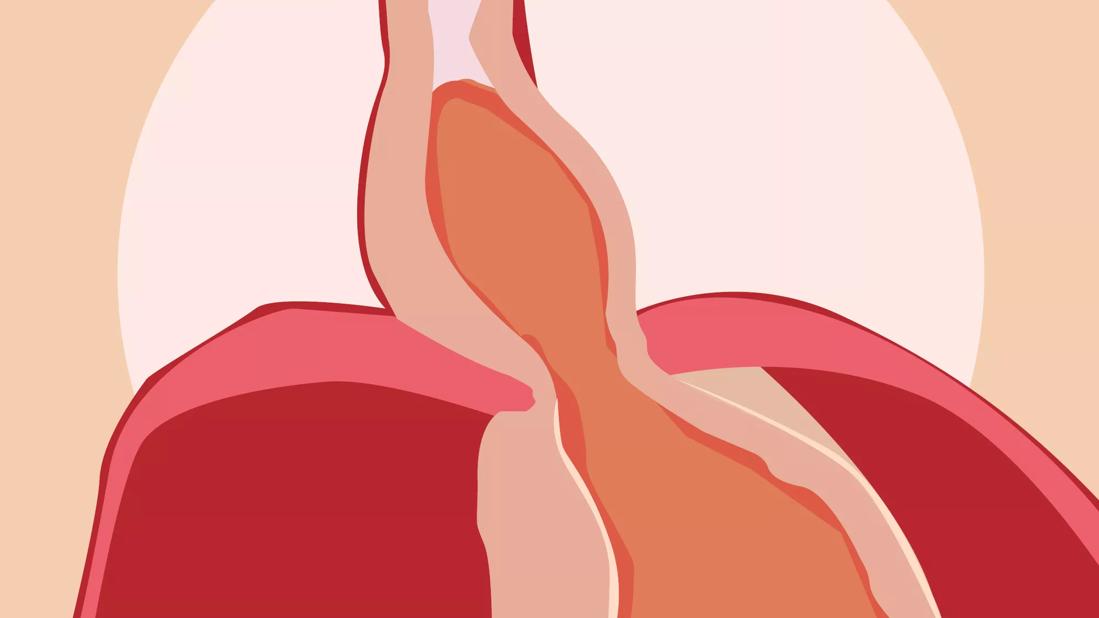Choose the best hernia center to avoid long-term pain and recurrence

Imagine having just a 50/50 chance of getting rid of your pain the first time you go in for surgery.
Advertisement
Cleveland Clinic is a non-profit academic medical center. Advertising on our site helps support our mission. We do not endorse non-Cleveland Clinic products or services. Policy
That’s the situation facing most hernia sufferers who require surgery. This is a get-it-right-the-first-time situation or else you’re back at square one.
Now, double down on this scenario for seniors who are suffering from a specific type of hernia. Hiatal hernias are most often found in people in their 70s and 80s. Many are treated with medication but, in the tougher cases, doctors recommend surgery.
“The absolute best time to get your hernia fixed, with the best chance of a great result, is the first time you get it fixed,” says general surgeon Michael Rosen, MD. “You want to go to somebody who’s a specialist and knows all the options. This will decrease the chances of complications like chronic pain or a recurrence of the hernia.”
Hernias are a hole in something that allows things to poke through that typically shouldn’t. Hiatal hernias are located in the diaphragm where the esophagus joins the stomach and they typically cause heartburn and reflux. If the hernia just makes you uncomfortable, your doctor will treat it with medications.
More serious hiatal hernias, also known as paraesophageal hernias, become larger over time and the stomach starts to rise farther into the chest. This sometimes causes significant chest pain after eating and can even cause weight loss and bleeding.
Advertisement
“In those cases, surgery is usually needed,” says Dr. Rosen. “It’s best to ask your doctor about treatment as soon as a hernia begins to cause discomfort.”
So why is that first surgery so important?
An unsuccessful surgery is frustrating for the surgeon, but even more so for the patient because of the resulting poor quality of life. Plus, the symptoms bothering you in the first place can return. Risks associated with remedial surgery include recurrent heartburn, difficulty with swallowing, increased bowel symptoms and nerve damage.
“Working with an experienced surgeon is best for any hernia patient, but surgeries for recurrent hernias, especially in older patients, are even more complex and challenging,” says Dr. Rosen.
If you reach the point where you need hernia surgery, it’s important to go to a comprehensive hernia center to get the best treatment. With expertise in both minimally invasive surgery and large comprehensive surgery, a dedicated hernia center helps ensure the operation is done right the first time.
“Advances in minimally invasive surgery mean that, for many patients, hernia surgery is no longer a major operation that puts you in the hospital for a week to 10 days,” says Dr. Rosen. “Patients now typically go home within a couple of days.”
In most patients, the cause of a hernia is not known but an injury, straining or weakness in the area may contribute. Two other types of hernias can impact the elderly but are no more likely to occur later in life than at a younger age.
These hernias occur in the groin and are more common in men. They are typically associated with heavy lifting, constipation and prostate issues that cause urination difficulty or increases in abdominal pressure.
“They can cause a lot of pain and discomfort,” says Dr. Rosen. “There is no way to prevent any hernia and not doing heavy lifting wouldn’t prevent them.”
Once you notice a bulge in your groin that causes discomfort, it’s time to go see a physician.
“Once you have a hole there, it will never go away on its own,” says Dr. Rosen. “Most of these hernias can now be fixed using minimally invasive techniques with decreased post-op pain. They can help you return to regular activity levels a lot quicker.”
Ventral hernias occur in the abdomen and also exhibit a bulge and pain. These will not go away and there’s no way to prevent them. These hernias are more common in people who have obesity, diabetes or chronic smoking habits, but being in good health reduces the chances of those complications.
Advertisement
“Sometimes doctors perform these surgeries laparoscopically and sometimes they reconstruct the entire abdominal wall. The latter provides two advantages,” says Dr. Rosen. “It improves your functional outcome because you get your core muscles back, plus it improves the cosmetics because you end up with a flatter abdomen.”
Advertisement
Learn more about our editorial process.
Advertisement

It’s not an enema or bowel prep, and this colonic hydrotherapy can harm proper colon function

Family history can increase your risk of developing this autoimmune disorder — you may want to see a healthcare provider for screening

Exercising and stretching your lower back, hamstrings, hips and quads can greatly improve your physical well-being

Choose foods that are easily broken down in your digestive system, like fruits and vegetables without skins or seeds

Focus on exercise, eating healthy and getting regular screenings to help lower your risk

A low-FODMAP diet or gluten-free diet could help you manage your symptoms, but only with professional guidance

Many chronic conditions can cause fatigue — but don’t overlook mental health concerns, iron level and hormones

A low-fat, high-fiber diet can help prevent gallbladder attacks and keep you pain-free

If you’re feeling short of breath, sleep can be tough — propping yourself up or sleeping on your side may help

If you fear the unknown or find yourself needing reassurance often, you may identify with this attachment style

If you’re looking to boost your gut health, it’s better to get fiber from whole foods